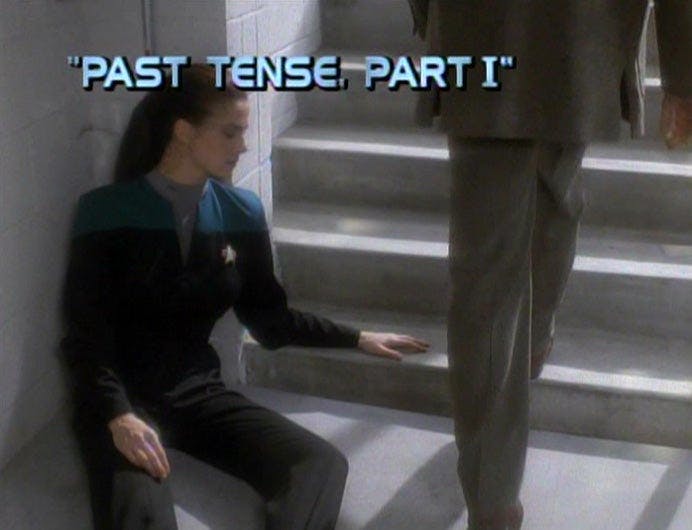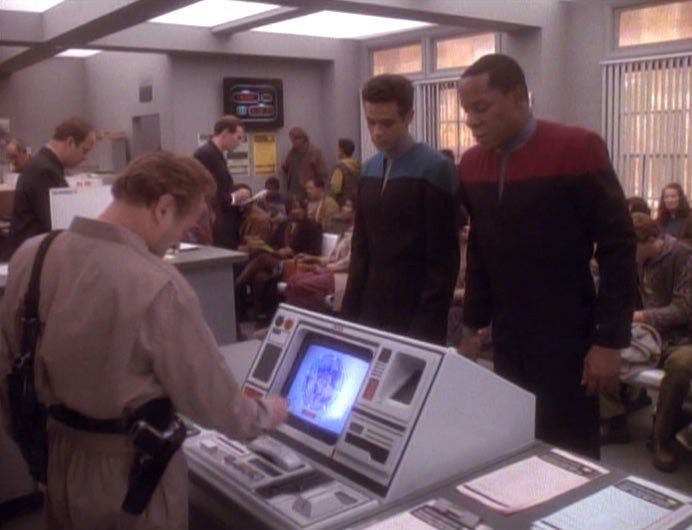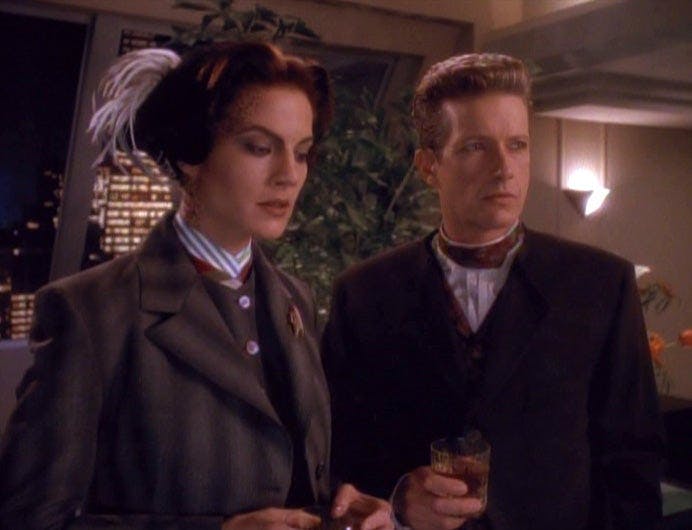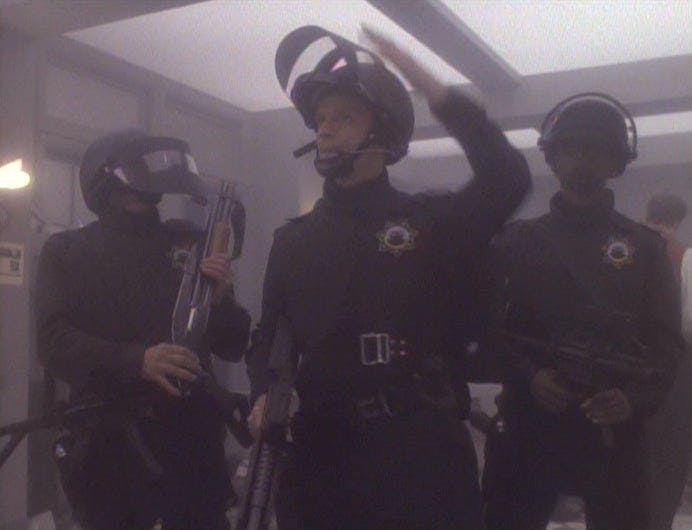Published Jul 11, 2021
DS9's Take on Homelessness is All Too Real
"Past Tense, Parts I & II" has some important lessons for both Americans and their president.

StarTrek.com
This article was originally published on December 21, 2019
"21st-century history isn't one of my strong points. Too depressing."
- Doctor Bashir, "Past Tense, Part 1"
One of the things Star Trek fans enjoy the most when talking about the franchise to outsiders is all the ways the show has influenced or predicted the future. You can see the invisible hand of Star Trek in the desktop computer, in the flip-phone, in the way we all interact with friendly female-voiced digital assistants. Shows have predicted the moon landing (correct within three hours) and that the 1999 Yankees would have a great season. The first space shuttle was named Enterprise after fans campaigned for the honor.
But what about the times when Star Trek’s predictions are terrifying?

StarTrek.com
Rumors have begun circulating that the Trump administration plans on “solving” the homelessness problem on the West Coast by rounding up unhoused people and placing them in camps. Administration officials have been seen scoping out FAA facilities outside of Los Angeles for the purpose.
“The people of San Francisco are fed up, and the people of Los Angeles are fed up,” President Trump said. “We’re looking at it, and we’ll be doing something about it.”
It’s an audacious plan, a plan that is alarming many people interested in social progress, and a plan that Deep Space Nine’s “Past Tense, Parts 1 & 2,” essentially nailed back in 1995.
Sisko: By the early 2020s, there was a place like this in every major city in the United States.
Bashir: Why are these people in here? Are they criminals?
Sisko: No, people with criminal records weren't allowed in the Sanctuary Districts.
Bashir: Then what did they do to deserve this?
Sisko: Nothing. They're just people without jobs or places to live.
Bashir: So they get put in here?
Sisko: Welcome to the 21st century, Doctor.
In the Season 3 two-parter, Sisko, Bashir, and Dax have one of those classic transporter accidents that befall the cast once a season or so. This one kicks them to the year 2024 - which was centuries in the past for our intrepid crew, and 30 years in the future for us watching at home.
In this imagined 2024, San Francisco seems to be made up entirely of the unhoused and tech billionaires, France is being rocked by student protests, and everyone uses their computer to watch TV — predictions that were all clearly way off. Caught out in the street without ID, the men of color in the group, Sisko and Bashir, are immediately corralled into Sanctuary District A, while Dax (who is a pretty white woman) gets whisked away to the upper echelons of San Francisco high-society and tries to search for them.

StarTrek.com
Good Starfleet officers that they are, Sisko and Bashir try to avoid getting embroiled in events, until they inadvertently cause the death of Gabriel Bell, a historical figure who Sisko will have to impersonate if history is to go according to plan.
While the show accurately predicted that we’d have a housing crisis, and that some people in power might start suggesting radical solutions to the problem, getting the prediction game “right” isn’t what DS9 was about. Science fiction in general, and Star Trek in particular, are never just about predicting the future - they’re about using a futuristic lens to look at the present day.
Sisko, Bashir, and Dax are looking through that lens at us, and their reaction is one of complete and utter disgust.
Bashir: There are any number of effective treatments for schizophrenia in this day and age. They could cure that man now, today, if they gave a damn.
Sisko: It’s not that they don’t give a damn. They’ve just given up. The social problems they face seem too enormous to deal with.
Bashir: That’s even worse. Causing people to suffer because you hate them is terrible, but causing people to suffer because you have forgotten how to care... that's really hard to understand.
Sisko: They’ll remember. It’ll take some time, and it won’t be easy, but the people in this century will remember how to care.
In a general sense, Star Trek often shies away from detailed specifics in explaining how Federation society works, and how it came to be. This makes sense; if we knew how to create a post-scarcity utopia that took to the stars just for the sake of advancing human knowledge, we’d probably already be doing that.
But with “Past Tense,” the writers argue for the one thing we do know we’ll need: empathy. The Federation is, at its core, an organization that cares — about its citizens, about its neighbors, about the greater good.

StarTrek.com
Recently, President Trump told reporters that homelessness was ruining San Francisco and Los Angeles because they were blocking the entrances to the cities’ most-prestigious buildings. “In many cases, they came from other countries and they moved to Los Angeles or they moved to San Francisco because of the prestige of the city, and all of a sudden they have tents,” he said.
Sending a crew with Starfleet values back to a time when the only problem people had with homelessness is that it’s unsightly, or that it detracts from the family-friendly character of downtown spaces, offends our heroes on a deep level that doesn’t let up for the entire two-parter.
It’s that conflict — empathy vs. apathy — that forms the real conflict of this episode, even when the stakes turn life-or-death and Sisko finds himself forced to impersonate a historical figure to make sure a hostage crisis goes the way the Federation remembers it happening. There’s action and shootouts, but the real battles of the episodes are wars of words, as Sisko and Bashir and Dax try desperately to remind the people around them that the moment you decide your problems are insurmountable, they become insurmountable.
Vic, a Sanctuary guard played by the late, great character actor Dick Miller, stands in for the crustiest, most pessimistic of all of us throughout the episode, angrily calling his unhoused captors “losers,” berating the people under his care, and serving as the strongest foil for Sisko throughout the story. It’s through their conversations that we get an exchange that, in many ways, forms the beating heart of the Star Trek philosophy:
Sisko: You don’t know what any of this is about, do you? You work here! You see these people every day, how they live, and you just don’t get it!
Vic: What do you want me to say, that I feel for them? That they got a bad break? What good would it do?
Sisko: It would be a start!
For Sisko, simply remembering to care is the beginning of a solution in and of itself. It is easy to de-personalize others — the homeless, the mentally ill, people who have trouble fitting into our society for one reason or another. It’s not so very far from there to saying that they deserve their lot in life, and that it isn’t our problem.

StarTrek.com
This is all hypothetical, of course. One administration official told the Washington Post: “We’re not rounding people up or anything yet.” The ‘yet’ is an ominous reminder that this has not, in a broader sense, been an administration afraid of rounding people up and putting them in camps. But, for the moment, the idea of Sanctuary Districts are as fictional as the Vulcans.
Recently, in an episode of Star Trek: Discovery, Anson Mount’s Christopher Pike said that to be a Starfleet officer is to believe “in love.” It was clear that he didn’t mean something romantic by that, but that he and Sisko embraced the same basic Federation philosophy: Saying that you empathize with others is the start. If we can start there in 2019, perhaps DS9’s past won’t end up being our future.
Sean Kelly (he/him) is a freelance writer based in St. Louis. He occasionally gets depressed that he’ll never know what raktajino tastes like.

